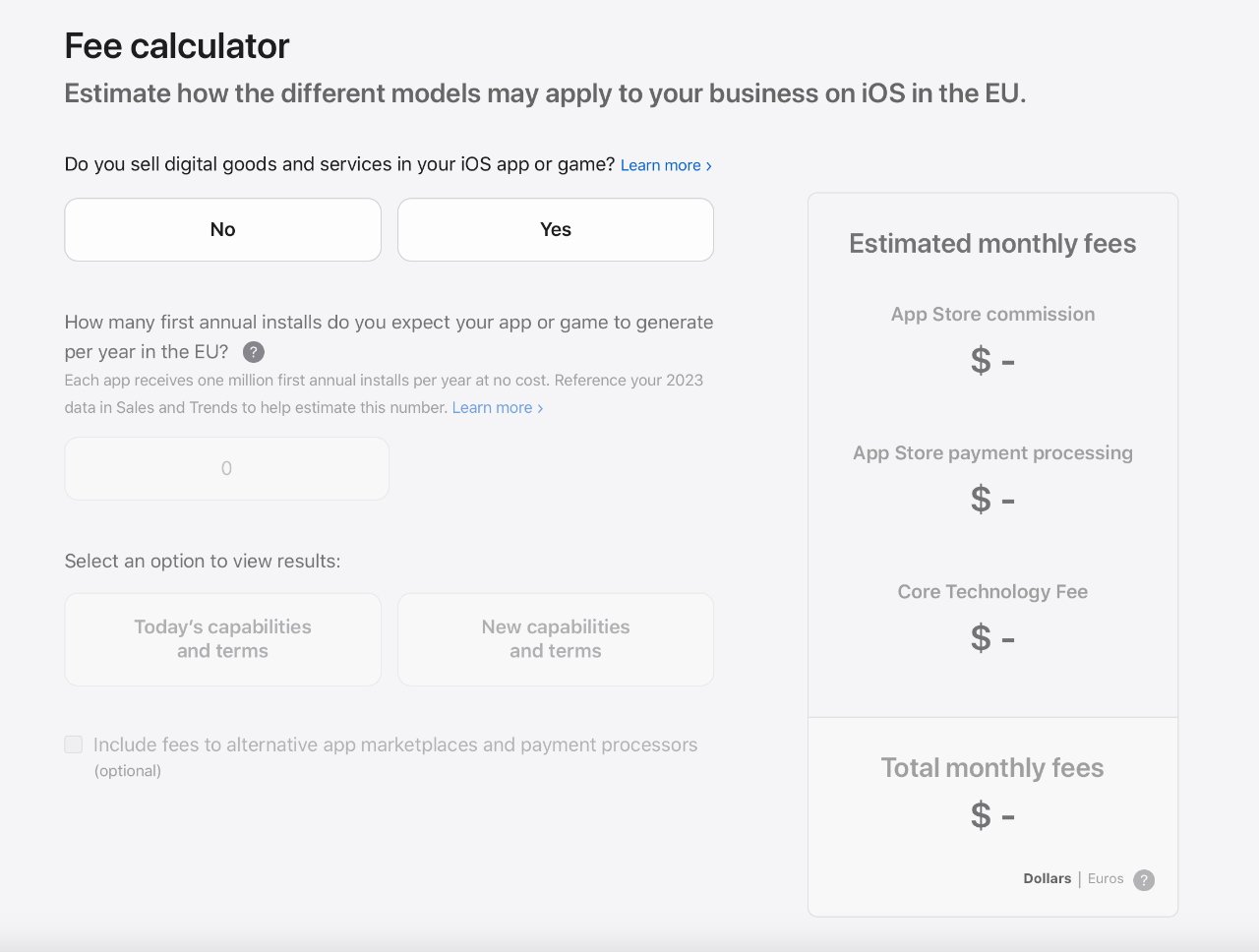Who should stay on and who should leave the EU App Store
Even as EU developers get the option to sell apps outside of the App Store, there are some who should stay with Apple, and a few who should go it alone. Here's the breakdown.

Developers will need to calculate carefully whether it's worth leaving the App Store. (image: PCalc app on an iPhone)
Apple is enabling developers in the EU to sell apps through alternative stores, but of course it wants them to stay within its existing App Store. Call it concern for the security of iOS, or call it a desire to keep all the App Store fees, but the result is that moving away is not a simple decision.
There are developers who should not leave Apple, there are others who should make their own alternative app stores, and then there are those in the middle where it's worth accepting Apple's new EU business terms. That last type of developer can stay in the App Store or move to a third-party one, but there are costs that have to be considered.
Stay where you are on the App Store
If you are a small developer in the European Union who has one or two free apps on the App Store, stay there. Don't bother with Apple's online fees calculator, just stay right where you are.
Sticking with Apple for free apps means being on the largest App Store and paying nothing. There has always been an issue of how difficult it is for apps to be found among the millions of others on the App Store, but the new rules don't change that.
Unless some alternative app store becomes extraordinarily huge and popular, there will never be one where a developer's app will be potentially put in front of as many users as Apple's store does all the time. Then if a third-party store does get that enormous, each developer has the same problem of a lack of discoverability.
No one knows what alternative app stores will charge developers to have their apps included. Meta has previously been revealed to be charging around 50% to developers submitting to its VR App Store. Epic is charging 22% on its existing "self-publishing" platform.
However, alternative app stores might conceivably emulate Apple and not charge a fee for a free app. Even if they do that, though, there is a problem -- which also also hits freemium apps.

Detail from Apple's App Store fee calculator
A freemium app is one where the app itself is free but developers make a living from selling things through it, such as upgrades to premium versions. Under Apple's App Store terms, it has always been that a freemium developer pays nothing when someone downloads their app, and up to 30% when they buy something through an in-app purchase.
This is no longer the case for any free or freemium app, if it is sold via an alternative app store. Developers who sign the new EU agreement in order to then go on other stores, also incur charges from Apple which while they may not be onerous, they could be.
Accept Apple's new App Store terms
Sign up for Apple's new EU terms and you no longer pay the company a 15% or 30% cut for a paid app -- and you cannot switch back to the old system.
You could have to pay a sum for any app, whether it's free or paid -- and whether you sell it independently or even via Apple's own existing App Store.
It's called the Core Technology Fee and it is because however you're selling apps, you're using Apple's technology to get it onto the iPhone. Consequently iOS apps will be charged the equivalent of 54c for the first installation in a year - for every installation over the first million.
That obviously means when a user buys an app, but there is more. The user can delete and redownload the app as many times during a year without the developer being charged.
But they will be charged the Core Technology Fee again when a user redownloads it in the following 12 months.
Apple describes this as being for the First Installs of an app and it means the first time on any device. Users can then install the same app on all the devices they own.
This all means that a developer must either sell under a million, or sufficiently over a million and have an income from the sales, in order to make it definitely worth leaving Apple.
To balance this, if a developer signs the EU agreement but stays within Apple's App Store, Apple will cut the commission it charges for apps and in-app purchases. The standard rate will drop from 30% to 17%, while apps that now get charged the reduced 15%, will instead be charged 10%.
It's going to be a fine calculation over whether this balances out, whether the discount rate plus a Core Technology Fee will work out better for the developer. It's also a fine calculation that has to be based on estimates of how popular an app is going to be.
Apple says that in preparing for this change, it looked at more than popularity and sales figures. Apps can be paid or have in-app purchases, but developers can also derive income from advertising or related sales, such as of physical times or event tickets.
Consequently, while it's theoretically possible for an app to be downloaded millions of times and earn no income, Apple says that it's extremely unlikely.
Ultimately, it comes down to the popularity of the app. And if the app will be very popular, then a developer can set up their own alternative app store and sell it through that.
Go your own way, and make your own App Store
Setting up an entire store yourself means having to pay for payment processing. Larger developers will already have systems in place because they sell through other platforms, though, so adding one more option should not be costly.
It's not possible to estimate an average of how much it would cost a firm to implement this from scratch, but there are two figures to work from.
One is that Apple requires any developer who runs an app store to prove it has a line of credit, from an A-rated financial institution, valued at least at one million Euros ($1.1 million). The other is that developers can elect to use Apple's payment processing, for a 3% cut of the fees for the app and any in-app purchases.
Medium-sized developers will probably be best off paying Apple. It will come down to the cost of running their own backend payment systems, and how many copies of their apps they expect to sell.
Epic Games's "Fortnite" reportedly had 650 million users, according to Business of Apps, before it was pulled from the App Store. With that volume of sales, it's not a surprise that Epic will launch its own app store.
Plus there already is an Epic Games app store, for platforms other than the iPhone, so the company is well-versed in operating payment processing, and in all areas of online sales.
Consequently the idea of paying Apple nothing instead of always paying it 15% or 30% is both appealing and possible for larger developers.
Only, while Apple will not charge for apps that are sold outside of its App Store, there are fees that can apply.
Calculating the move to a third-party store
Apple has provided an online calculator for estimating the fees a developer could end up paying. But if developers should use that calculator, and should do extensive cost/benefit analyses, there is a quicker way to determine whether it's worth investigating a move away from Apple's App Store.
Moving away is only potentially worthwhile if your app sells many millions of copies, and has lucrative in-app purchase options. Really it's only worth it if you are very large developer who already sells apps through other platforms.
Apple doesn't want developers to leave the App Store, it is being forced by the European Union to allow it. There was never a moment's chance that the firm would arrange it so that every developer would be better off outside of its aegis.
Read on AppleInsider


Comments
it boggles the mind that Spotify, the worlds largest music streaming service by far (and more of a monopoly in music than Apple is in smartphones) doesn’t have to abide by the DMA. Any artist that wants to be on Spotify has to agree to their terms. That’s the very definition of a gatekeeper.
One interesting fact is that developers who create a 3rd party App marketplace (store) can’t use it for their own Apps. They have to accept submissions from other developers who might want to use their store. So Meta can’t open a Meta Store that ONLY has their Apps.
Spotify has effectively paid zero dollars to Google and Apple for several years now. Zero. Yet, there is the continual "storytelling" of them trying to get out of the platform fees, to this day. Spotify turned off in-app subscriptions on iOS for years now, and therefore 100% of iOS subscription revenue goes to Spotify. Then, not just 3 months ago, it was revealed during the Epic vs Google court case that Google gave them a deal where if an Android user uses Google's in-app payments, the platform fee is 4%, and Spotify was able to use their own payment system with Google getting 0% of that.
What the hell is Spotify's problem? They are literally paying no fees on Android and iOS, and it's been like that for years? Every single advantage has been given to them, and they want more, and the media is more than willing to play the story that they are being bullied. They clearly are not being bullied whatsoever. Even in the EU, iOS is at a minority share of 25%, and Apple really can't drive much at that marketshare. Ultimately, if the EU can drive Google/Youtube Music, Apple Music, Amazon Music and Tencent Music subscribers to be Spotify subscribers, Spotify would love it! They want to get to a monopoly position in music and media streaming.
Then, Epic, sheesh. They were making something like $500m to $1000m revenue per year on Android and iOS. This was only about 10% of their revenue. Their revenue is 90% driven by Sony Playstation, MS XBox and Nintendo Switch. 90%! That 90% where they had to pay a platform fee of 30% on all three console platforms, just like on Android and iOS. What is their problem? They are essentially making billions of dollars on an afterthought platform at incredible margins and had the same deals as every other platform they are on. They aren't being bullied by Apple here either, and that media storytelling, keeps on hitting that well of how Apple is bullying Epic.